Articles
- Page Path
- HOME > J Korean Acad Nurs > Volume 42(2); 2012 > Article
-
Original Article
- Analysis of Trends and Contents of Nursing Doctoral Dissertations in Korea
- Kwang-Ja Lee, Younhee Kang, Mee Ock Gu, Kyunghee Kim, Oksoo Kim, Yeon-Ok Suh, Eunyoung Suh, Soo Yang, Eun-Hyun Lee, Ja Hyung Lee, Myoung-Ae Choe, Yang Sook Hah
-
Journal of Korean Academy of Nursing 2012;42(2):302-309.
DOI: https://doi.org/10.4040/jkan.2012.42.2.302
Published online: April 30, 2012
1Professor, Division of Nursing Science, Ewha Womans University, Seoul, Korea.
2Associate Professor, Division of Nursing Science, Ewha Womans University, Seoul, Korea.
3Professor, College of Nursing, Gerontological Health Research Center, Institute of Health Sciences, Gyeongsang National University, Jinju, Korea.
4Professor, Department of Nursing, Chung-Ang University, Seoul, Korea.
5Professor, Department of Nursing, Soonchunhyang University, Cheonan, Korea.
6E. Associate Professor, College of Nursing, Seoul National University, Seoul·Researcher, Research Institute of Nursing Science, Seoul National University, Seoul, Korea.
7Professor, College of Nursing, The Catholic University of Korea, Seoul, Korea.
8Associate Professor, Graduate School of Public Health, Ajou University, Suwon, Korea.
9Professor, College of Nursing, Seoul National University, Seoul, Korea.
- Address reprint requests to: Lee, Kwang-Ja. Division of Nursing Science, Ewha Womans University, 11-1 Daehyun-dong, Seodaemun-gu, Seoul 120-750, Korea. Tel: +82-2-3277-2882, Fax: +82-2-3277-2850, kjlee@ewha.ac.kr
© 2012 Korean Society of Nursing Science
- 975 Views
- 1 Download
- 5 Crossref
Abstract
-
Purpose
- This study aimed to identify contents and trends of Korean nursing doctoral dissertations in terms of research methodology and theoretical characteristics.
-
Methods
- The design of the study was descriptive study and a total of 1,089 quantitative studies completed between 1982 and 2010 were reviewed using the analytical framework developed by the researchers.
-
Results
- The majority of studies utilized the experimental design (51.5%) and the others were survey design (38.8%) and methodological design (5.0%). Study subjects were shown as patients (45%), care givers (11.2%), ordinary persons (40.6%) and others (3.2%). There were growing trends in experimental design and patients as subjects. The prevailing data collection settings were hospitals (45.8%) and community (27.8%). The theoretical frameworks that studies were based on were the existing theories (37%) and a newly developed theoretical framework by a researcher (25.2%). a framework derived from other studies by the researcher (25.2%). Majority of studies (78.5%) employed a single theory as a theoretical framework. However, 31.8% of studies had no theoretical framework based on.
-
Conclusion
- Findings of this study provided the opportunities to shed new light on the current status of Korean doctoral dissertation and to deliberate on the future direction of nursing studies in Korea.
- 1. Choe M.A., Hong K.J., Han K.J., Park Y.S., Park S.A., Han Y.S., et al. Trends of doctoral dissertations of one college of nursing in Korea. Journal of Korean Academic Society of Nursing Education. 2009;15:32–43.Article
- 2. Kim E.S., Kim G.S., Kim D.R., Kim E.J., Sung K.M., Shin H.K., et al. Trends of nursing science inquiry in doctoral dissertations. Journal of Korean Academy of Nursing. 2004;34:315–323.ArticlePubMedPDF
- 3. Kim H.G., Lee Y.S. A statistical analysis on nursing-related theses in Korea. Korean Nurse. 1996;34:68–81.
- 4. Kim M.J., Lee M.S., Lee M.H., Lee W.I. Analysis of experimental studies on master's and doctoral theses in nursing. Journal of Korean Academy of Nursing. 1994;24:96–114.ArticlePDF
- 5. Shin H.S., Hyun M.S., Ku M.O., Cho M.O., Kim S.Y., Jeong J.S., et al. Analysis of research papers published in the Journal of Korean Academy of Nursing-focused on research trends, intervention studies, and level of evidence in the research. Journal of Korean Academy of Nursing. 2010;40:139–149. http://dx.doi.org/10.4040/jkan.2010.40.1.139.PubMed
- 6. Shin H.S., Sung K.M., Jeong S.H., Kim D.R. Trends of doctoral dissertations in nursing science: Focused on studies submitted since 2000. Journal of Korean Academy of Nursing. 2008;38:74–82. http://dx.doi.org/10.4040/jkan.2008.38.1.74.ArticlePubMed
- 7. Spear H.J. Nursing theory and knowledge development: A descriptive review of doctoral dissertations, 2000-2004. Advances in Nursing Science. 2007;30:E1–E14.Article
- 8. Suh Y.O., Park J.S., Yang J.H., Kim H.W., Suk M.S., Shin H.S., et al. Analysis of research papers published in the Journal of Korean Academy of Nursing. Journal of Korean Academy of Nursing. 2007;37:1013–1019.ArticlePubMedPDF
REFERENCES
Figure & Data
REFERENCES
Citations

- An Integrative Review of Korean Nursing Studies on Pediatric Tonsillectomy
Kyoung Eun Yu, Jin Sun Kim
Child Health Nursing Research.2017; 23(4): 416. CrossRef - Trend Analysis of Research in the Journal of Korean Gerontological Nursing (2010~2015)
Yerin Cha, Joeun Kwon, Sunhye Kwon, Kyung Hee Lee, Jiyun An
Journal of Korean Gerontological Nursing.2017; 19(2): 92. CrossRef - Analysis of Trends and Contents of Ancestral Ritual Foods of Korean Jong-ga
Changhyeon Lee, Young Kim, Young Hwang, Hyeonmi Kim
Journal of The Korean Society of Food Culture.2016; 31(4): 286. CrossRef - A Historical Trends of Doctoral Nursing Education in Korea
Kasil Oh, Young Sook Park, Ja Hyung Lee, Kyong-Ok Oh, Yang Heui Ahn, Jiyoung Lim
The Journal of Korean Academic Society of Nursing Education.2014; 20(1): 93. CrossRef - An Analysis of Nursing Research on Child Rearing in Korea.
Dong Won Lee, In Soo Kwon
Child Health Nursing Research.2014; 20(4): 264. CrossRef
General Characteristics (N=1,089)
Research Type (N=1,089)
ECG=Equivalent control group; NCG=Nonequivalent control group; OG=One group.
Research Subjects (N=1,089)
*Duplicate response.
Type of Data Collection Settings (N=1,089)
Framework, Number & Type of Theory used in Doctoral Dissertations (N=1,089)
ECG=Equivalent control group; NCG=Nonequivalent control group; OG=One group.
*Duplicate response.
 KSNS
KSNS
 E-SUBMISSION
E-SUBMISSION
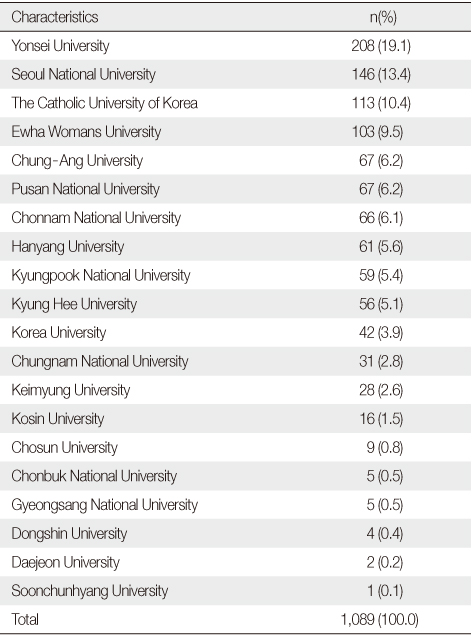
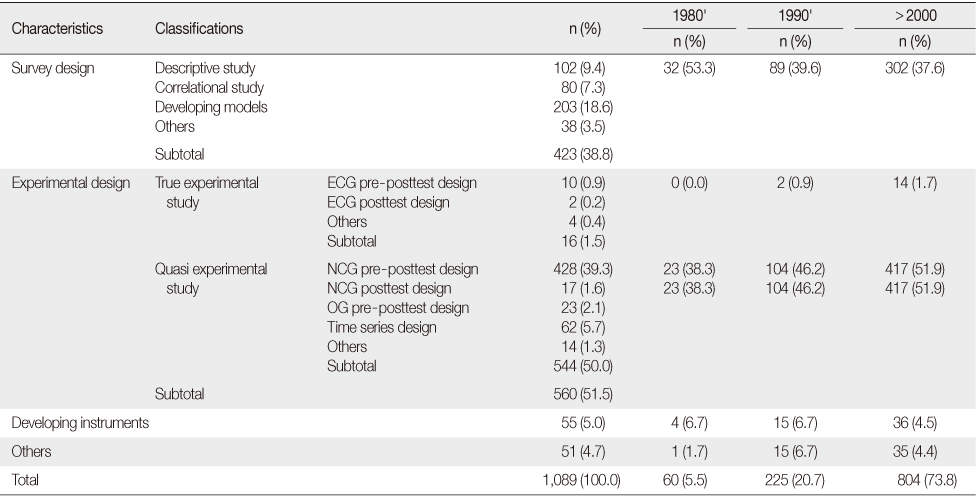
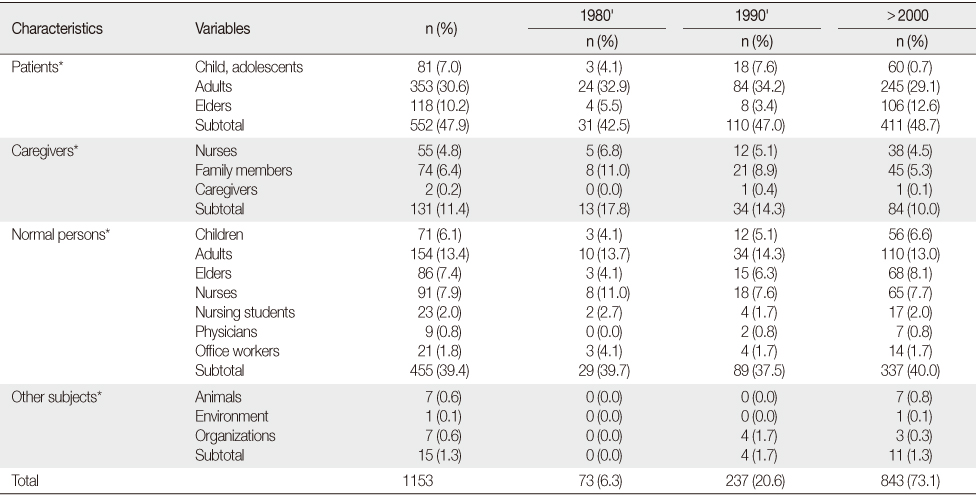
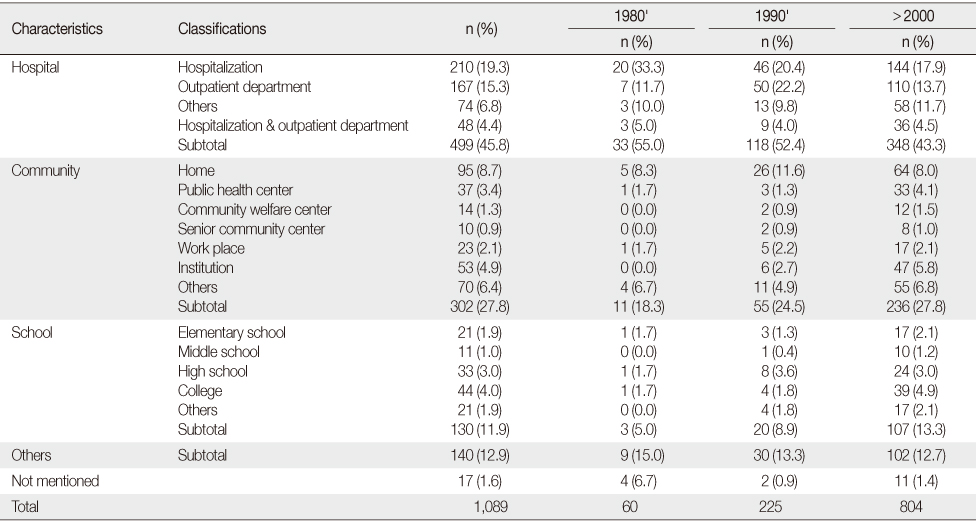
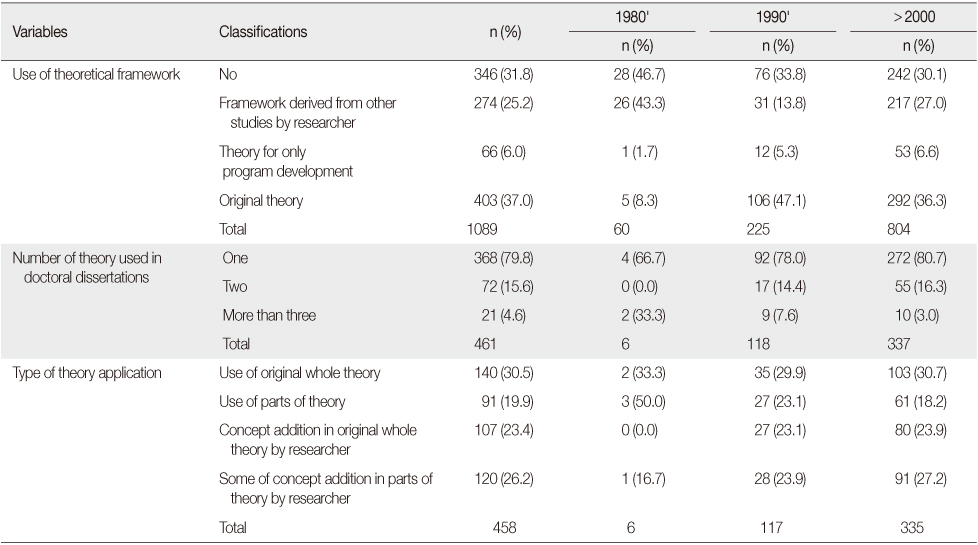
 Cite
Cite

